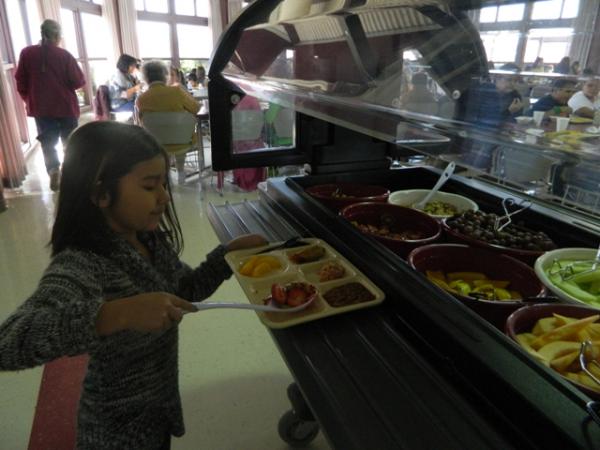Students in Indian Country Love Fruits and Vegetables from Salad Bars
A’ni (strawberry), adalonige gado galadisgi (carrot), gagama gagvmi (cucumber), gvgisdi (watermelon), and svkta (apple) -- Cherokee words for some of the favorite salad bar items for kids in Sequoyah Schools in Tahlequah, Oklahoma.
Angelia Dowty is the food service director for Sequoyah Schools, which includes an elementary Cherokee language immersion school and a Bureau of Indian Education (BIE) high school. These schools provide food to more than 500 Native American students and staff. Angelia serves all of these kids a variety of fruits and vegetables from salad bars every day. Angelia said, “When I took over the food service program 3 years ago, there were some sweet treats on the salad bars, like puddings. I took all of those out and now only serve fruits and vegetables on my bars.”
Like schools all over the country who have received salad bars from Let’s Move Salad Bars to Schools, she says that the kids definitely eat more fruits and vegetables with the bars available. She also has found that the salad bar is a great way to introduce new fruit and vegetable items for the kids to try, which makes it easier to incorporate these items into other dishes. In fact, she likes to serve fruits and vegetables that make kids say “What is that?”
The salad bar also is a good way to showcase local produce, such as locally grown strawberries, purchased as part of the Oklahoma (OK) Farm to School Program. Angelia and the OK Farm to School Program work with local distributors to purchase as many fruits and vegetables from local growers as possible. Future plans include working with a grower right outside of Tahlequah who can grow vegetables specifically for schools. Chris Kirby, farm to school coordinator for Oklahoma Department of Agriculture, Food and Forestry stated, “The Cherokee Nation is doing a great job using their Communities Putting Prevention to Work grant to study their food policies.” They are expanding the possibilities of working directly with local growers in their community. The OK Farm to School Program is also rolling out a Farm to School cookbook for school nutrition programs and a TV series showcasing kids at the farm and learning to cook from a chef.
Angelia shared her Let’s Move Salad Bars to Schools story with BIE Schools as part of the Let’s Move in Indian Country seminar series on February 14, 2012. Billi Grossman, a registered dietician who works for Sysco in New Mexico and acts as a consultant to BIE schools in the region, also discussed how produce distributors can assist schools in finding the right produce, already prepared for service, and at the right price to help keep salad bars stocked.
Are you a school in Indian country that would like to have a salad bar? Are you a student, teacher, or parent who would like to help your school get a salad bar? Visit Let’s Move Salad Bars to Schools for information and an application. Let’s Move Salad bars to Schools is a comprehensive public health effort to mobilize and engage stakeholders at the local, state and national level to significantly increase the number of salad bars in schools across the country until every child has the choice of healthy fruits and vegetables every day at school. Any school participating in the National School Lunch Program is eligible to apply. Currently more than 1,200 schools have received salad bars.

